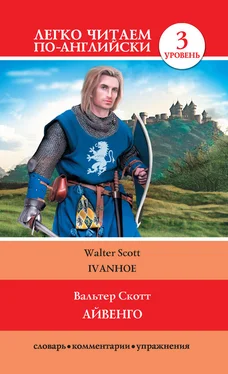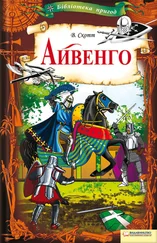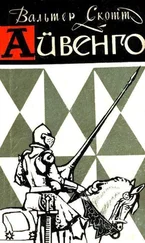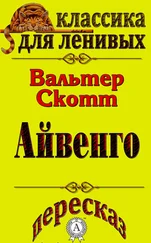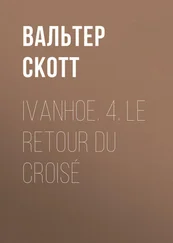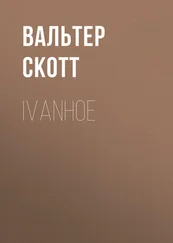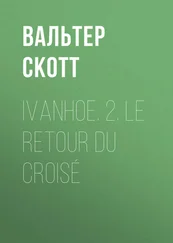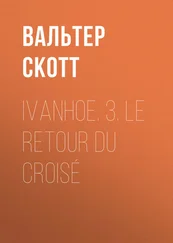“Thank you for your advice,” replied the Disinherited Knight, “and to answer it, I advise you to take a fresh horse and a new lance, for by my honour you will need both.”
After this he rode to the northern end of the lists, where he stood still, in expectation of his antagonist.
This piece of advice made Brian de Bois-Guilbert very angry, however he did not ignore it. He changed his horse for a fresh one of great strength. He chose a new and a tough spear. He also laid aside his shield, which had received some little damage, and took another from his squires.
The two champions stood opposite each other at the two ends of the lists. The trumpets gave the signal and the champions vanished from their posts with the speed of lightning, and clashed in the centre of the lists with the sound of thunderbolt. The lances burst into pieces, and it seemed for a moment that both knights would fall. However they managed their horses and returned to their positions, where each received a fresh lance from his squire.
A loud shout announced the interest of the spectators, but when the knights returned to their positions there was a silence, so deep and so dead, that it seemed the people were afraid even to breathe. After a short pause the champions again met in the centre of the lists, with the same speed, the same skill, the same violence, but not the same result as before.
The Templar aimed at the centre of his antagonist’s shield, and struck it so hard that the Disinherited Knight was shaken in his saddle. On the other hand, that champion had, at first, directed the point of his lance towards Bois-Guilbert’s shield, but, changing his aim almost in the moment of the clash, he pointed it to the helmet, a more difficult aim which also made the shock more irresistible. He hit the Norman hard on the helmet. The Templar was a very good rider, but when the straps of his saddle burst, he fell on the ground together with his horse.
In a moment he was on his feet, mad with fury and ready to fight with his sword. The Disinherited Knight jumped from his horse and also took out his sword. The marshals of the field, [18]however, separated them because the laws of the tournament did not on this day permit this kind of fighting.

“We will meet again,” said the Templar, “and where there are none to separate us.”
“If we do not,” said the Disinherited Knight, “the fault will not be mine.”
With these words the Disinherited Knight returned to his first station.
He then commanded a herald to announce to the challengers, that he was ready to meet them in the order in which they chose to advance against him.
The gigantic Front-de-Boeuf in black armour was the first who took the field. On his white shield there was a black bull’s head and the words, “Beware, I’m here”. This champion lost a stirrup in the fight and the judges decided that the Disinherited knight was the victor.
In the stranger’s third fight with Sir Philip Malvoisin, he was equally successful; striking that baron so hard on the helmet, that its laces broke, and the helmet fell off, and Malvoisin was declared defeated like his companions.
In his fourth combat with De Grantmesnil, the Disinherited Knight showed as much courtesy as he had showed courage and skill in the previous fights. De Grantmesnil’s horse, which was young, ran from its course and the rider couldn’t aim, but the stranger did not use this situation, he raised his lance and passed his antagonist without touching him. Then he sent a herald to invite his antagonist to meet for the second time. This De Grantmesnil declined, saying he was defeated by the courtesy of his opponent.
Ralph de Vipont summed up the list of the stranger’s triumphs, when he fell to the ground with such force, that the blood ran from his nose and his mouth, and he was carried away senseless.
The acclamations of thousands applauded the unanimous award of the Prince and marshals, announcing that day’s victor to be the Disinherited Knight.
* * *
The marshals of the field were the first to offer their congratulations to the victor. They asked him, at the same time, to remove his helmet before they conducted him to receive the prize of the day’s tourney from the hands of Prince John. The Disinherited Knight refused politely to do so, saying that he could not at this time allow his face to be seen. The marshals were perfectly satisfied by this reply, because it was then usual for knights to swear to remain incognito for a certain time or until some particular adventure was achieved. So the marshals announced to Prince John the winner’s desire to remain unknown.
John was both curious and displeased with the result of the tournament, in which the challengers whom he supported had been defeated by one knight.
“What do you think, my lords,” he said, turning round to his followers, “who can this proud knight be?”
“I cannot guess,” answered De Bracy.
“The victor,” said the marshals, “is still waiting the pleasure of Your Highness.”
“It is our pleasure,” answered John, “that he will wait until we can guess who he is.”
“Your Grace,” said Waldemar Fitzurse, “you cannot make the victor wait until we tell Your Highness something that we cannot know. At least I can’t guess who he can be, unless he is one of the knights who went with King Richard to Palestine.”
A whisper arose among the Prince’s followers, “It might be the King—it might be Richard the Lionheart himself!”
“God forbid!” said Prince John, turning at the same time as pale as death; “Waldemar! – De Bracy! Brave knights and gentlemen, remember your promises, and stand truly by me!”
“There is no danger,” said Waldemar Fitzurse, “Are you so little acquainted with the gigantic body of your father’s son, as to think that it can fit inside this armour? – Marshals, you will best serve the Prince by bringing the victor to the throne. – Look at him more closely,” he continued, “Your Highness will see that he is much shorter and smaller than King Richard.”
The marshals brought forward the Disinherited Knight to the foot of wooden stairs, which led to Prince John’s throne. There he received the war-horse which was the prize of that day. Then the knight rode round the lists to show the Prince’s present to the public.
In the meanwhile, Prior of Jorvaulx had reminded Prince John, that the victor must now show his good judgment by selecting from among the beauties who were present a lady who would fill the throne of the Queen of Beauty and of Love and deliver the prize of the tournament on the following day. The Prince made a sign for the knight, who turned towards the throne and remained motionless, expecting John’s commands.
“Sir Disinherited Knight,” said Prince John, “since that is the only title by which we can address you, it is now your duty, as well as privilege, to name the beautiful lady, who, as Queen of Honour and of Love, is to be a Sovereign on the next day’s festival. – Raise your lance.”
The Knight obeyed; and Prince John placed upon its point a crown of green satin with gold.
The knight went around the lists again, this time slowly – to examine the beautiful faces. At last the champion paused beneath the balcony in which the Lady Rowena was placed.
Whether from indecision, or some other motive of hesitation, the champion of the day remained stationary for more than a minute, while the eyes of the silent audience were fixed upon his motions, and then, gradually and gracefully sinking the point of his lance, he put the crown which it supported at Rowena’s feet. The trumpets sounded and the heralds proclaimed the Lady Rowena the Queen of Beauty and of Love for the following day.
Читать дальше
Конец ознакомительного отрывка
Купить книгу
